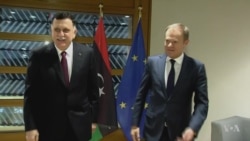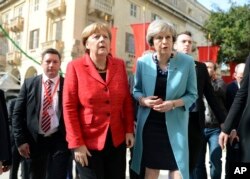After a summit in Malta Friday, the European Union agreed to a deal to support security forces in Libya to try to decrease the number of migrants arriving on the continent’s southern shores. But analysts warn with such a move, the EU risks cementing political divisions within Libya – and aid groups have criticized the deal for failing to recognize the dangers faced by migrants.
The deal will see the European Union give $215 million to Libya's U.N.-backed government in Tripoli to improve the security forces and coast guard. German Chancellor Angela Merkel said the approach was tried and tested.
She told reporters that cooperation with neighboring states - the same approach that we took with Turkey in the Aegean - has to be the answer to fighting illegal immigration.
Europe is banking on the internationally recognized government in Tripoli to implement the deal. But rival factions control much of the country – and they are not part of the agreement, says Luigi Scazzieri of the Center for European Reform.
“What is needed, really, is a broader deal that brings in other stakeholders within Libya as well.”
At odds with US
There is growing concern in Europe that Washington may switch its support to strongman General Khalifa Haftar, who is based in the east of Libya – though U.S. President Donald Trump has not signaled a change of policy. Again, Luigi Scazzieri says the EU might still change its stance.
“That would put Europe at odds with the U.S. policy. So in view of that I think, it may become more and more tempting for EU leaders to shift towards a policy in Libya which is more compatible with the one that the U.S. may well take,” Scazzieri said.
EU leaders are divided on how to respond to Trump – and many voiced concern.
British Prime Minister Theresa May – the first foreign leader to meet the new president in Washington – presented herself as a bridge between allies.
“Crucially, when I was there, I was able to confirm with him his 100 percent commitment to NATO,” May said.
May left the summit early – excluded from the final session of talks on Britain’s impending exit from the European Union. Relations are becoming increasingly acrimonious as Britain seeks bargaining power in the negotiations, says analyst Scazzieri.
“For example, will it use security cooperation with the EU, will it attempt to use that as leverage or not?” Scazzieri said.
The security threat was underlined Friday as an apparent terror incident unfolded in Paris. Security forces shot and seriously wounded a man as he attacked soldiers patrolling outside the Louvre museum.






